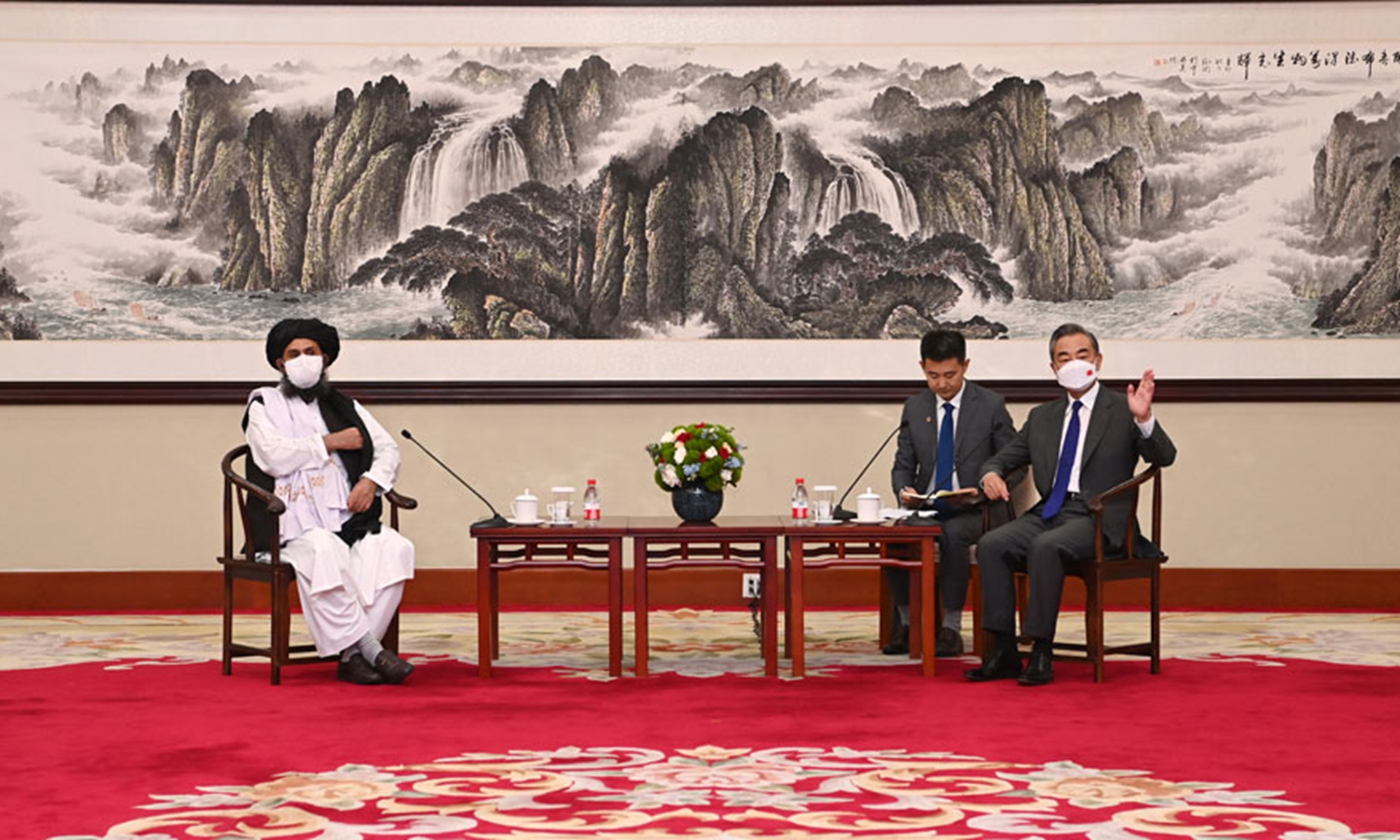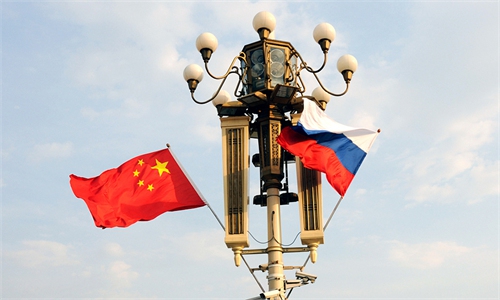Afghan Taliban’s China visit underscores importance of China’s role: expert
Taliban urged to break with ETIM, firmly crack down on terrorism to win trust of China

Photo:China's Foreign Ministry
China could play the role as a better mediator between the Afghan government and the Taliban for its smooth and high-level communication with both sides whose peace talks may be stuck in stalemate for a long time, analysts said in response to an Afghan Taliban delegation's trip in Tianjin on Wednesday and its reiteration of a previous promise of never allowing any force to use the Afghan territory to endanger China.
China reiterated that the East Turkistan Islamic Movement (ETIM) is a UN-designated terrorist group and hopes that the Afghan Taliban will make a clear break with all terrorist organizations including ETIM, Chinese State Councilor and Foreign Minister Wang Yi said while meeting with a Taliban delegation from Afghanistan in Tianjin on Wednesday.
The meeting came after a Taliban delegation visited Moscow at the beginning of July. Analysts said instead of visiting other regional countries, the Taliban chose to first visit Russia and China, which shows it has recognized the two countries' previous efforts in promoting the peace process in Afghanistan and eyed a bigger role for them in future reconstruction of the war-torn country.
As an important military and political force in Afghanistan, the Afghan Taliban is expected to play an important role in the peaceful reconciliation process in Afghanistan. We hope that the Afghan Taliban will put national interests first, hold high the banner of peace talks, establish the goal of peace, build a positive image and pursue an inclusive policy, Wang said during the meeting.
Wang noted that as Afghanistan's largest neighbor, China has always respected Afghanistan's sovereignty, independence and territorial integrity. The hasty withdrawal of US and NATO troops from Afghanistan marked the failure of US policy in Afghanistan and it is an opportunity for the Afghan people to stabilize and develop their country.
The situation in Afghanistan has entered a crucial period after the US pulled out most of its forces and peace talks between the Taliban and the Afghan government are in stalemate, with both parties seeking a breakthrough. Against this backdrop, the Taliban delegation visited China to elaborate its stance and to win support from China, Wang Jiang, a distinguished research fellow at the Institute for Frontier Region of China, Zhejiang Normal University, told the Global Times.
In a previous exclusive interview with the Global Times, Afghan Ambassador to China Javid Ahmad Qaem expressed deep distrust toward the Taliban. "The sincerity of the Taliban for peace talks leaves a very big question mark upon them," Qaem said, adding that the biggest challenge to the political settlement is the Taliban itself.
Wang Jiang noted that the members of the Taliban delegation to China showed their sincerity and goodwill to help China further understand them, for example the representative from religious commission may explain the Taliban's changes on religious polices.
The delegation was led by Taliban political commission representative Mullah Abdul Ghani Baradar with representatives from the religious commission and publicity commission alongside, according to the release from the Chinese Foreign Ministry.
Baradar said on Wednesday the Afghan Taliban has full sincerity in realizing peace in the country and is willing to work with every party to build a political system that is widely accepted by Afghanistan people and will protect human rights and the interests of women and children.
Before the visit to China, a Taliban delegation visited Moscow on July 8, meeting Kremlin envoy for Afghanistan Zamir Kabulov who expressed concerns about the escalation and tensions in northern Afghanistan. Kabulov also urged the Taliban "to prevent them from spreading beyond the country's borders," AP reported.
"After returning to the Afghan mainstream politics since US-led troops withdrawal, the Afghan Taliban chose to first visit Russia and China instead of other countries - two powers that have no sharp conflicts of interests with it. It shows the Taliban attaches great importance to developing ties with the two major countries, and it believes in their influence in helping to rebuild Afghanistan," Li Wei, an expert on national security and anti-terrorism at the China Institute of Contemporary International Relations, told the Global Times.
Li said that Russia, which has learned lessons from history, hopes to keep good ties with parties in Afghanistan, and China, with its consistent stance on Afghanistan being governed by Afghans, has maintained good connections with different forces in Afghanistan.
China has always been willing to promote the peace process in Afghanistan, for example, using multilateral mechanism to encourage peace talks and offering to host intra-Afghanistan talks for the Taliban and the government in China, Li said, noting that China could play as a better coordinator as it has smooth and high-level communication with leaders of the Afghan government and the Taliban.
Sultan Baheen, former Afghan ambassador to China, told the Global Times that in the eyes of all Afghans, including the Taliban, China is the most trusted and confident friend and could play a bigger role as a mediator than any other country to promote peace in Afghanistan.
Reiterate promise
When meeting with the Taliban delegation in Tianjin, Wang Yi stressed that ETIM is an international terrorist organization listed by the UN Security Council, which poses a direct threat to China's national security and territorial integrity. Cracking down on ETIM is the shared responsibility of the international community.
This is not the first time Wang Yi has expressed this stance. During a joint press conference with Tajik Foreign Minister Sirojiddin Muhriddin following their talks in Dushanbe on July 13, Wang said the Taliban should realize the responsibilities it bears for the nation and make a clean break with all terrorist forces.
Baradar of the Taliban delegation said the Afghan Taliban will never allow any force to use the Afghan territory to endanger China.
Previously, in an interview with This Week in Asia, Taliban spokesperson Suhail Shaheen said the organization sees China as a "friend" to Afghanistan. The Taliban would no longer allow Uygur separatists, some of whom had previously sought refuge in Afghanistan, to enter the country. The Taliban would also prevent al-Qaeda or any other terrorist groups from operating there.
In 2002, the UN Security Council's 1267 Committee imposed sanctions against ETIM. In 2003, China recognized and declared it as a terrorist organization. The group has been responsible for hundreds of terrorist attacks since it was founded. It was also found as the black hand behind many terror attacks in Northwest China's Xinjiang Uygur Autonomous Region. For example, the bomb and knife attack at Urumqi railway station on April 30 in 2014 and attacks in Kashi on July 30, 31 in 2011.
However, former US Secretary of State, Mike Pompeo, announced on October 20, 2020 the revocation of a previous decision that designated ETIM as a terrorist organization, a move that experts on anti-terrorism criticized as "whitewashing" terror groups related to China's Xinjiang which will backfire on the US.
Analysts said that the Taliban is fragmented as many of its senior leaders are not in Afghanistan, thus some branches of the Taliban in Afghanistan have taken in members of ETIM. However, no matter who forms the Afghan government, they know clearly that continuing anti-terrorism is Afghanistan's international responsibility as well as the significant foundation of future China-Afghanistan relations.
China and regional countries worry that changes to the situation in Afghanistan may squeeze the room of extremist terrorism groups including ETIM in Afghanistan, and force them to flee to other neighboring countries. With the Afghan Taliban's return to the mainstream, one key for it to win China's trust is to reach consensus on anti-terrorism with China and taking concrete actions, Wang Jiang said.

